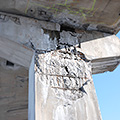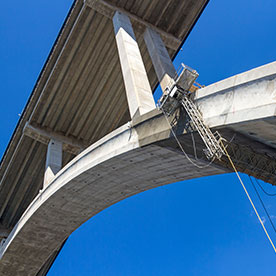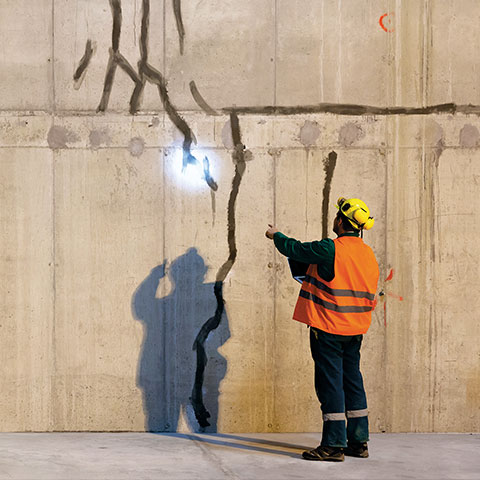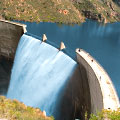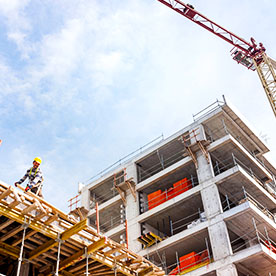Advanced Infrastructure Management / CIV5067Z
This course exposes the student to the concepts of municipal infrastructure management. These concepts include the context of Infrastructure Asset Management Planning, the process of Infrastructure Asset Management Planning and the techniques required to prepare an Infrastructure Asset Management Plan. The course will also introduce the student to the following asset management practices and processes: Customer profiling, investment appraisal and financial planning, and lifecycle delivery.
Deterioration and Condition Assessment of Concrete Structures / CIV5138Z
This advanced course aims to develop an understanding of durability aspects, service life design, and non-destructive testing of concrete structures. Topics include: introduction to advanced concrete technology; concrete deterioration mechanisms (physical, mechanical and chemical deterioration); reinforcement corrosion (principles, mechanisms, modelling, assessment, prevention); Alkali Silica Reaction (ASR); chemical attack; cracking of concrete structures; fire damage to structures; prevention of concrete deterioration thorough material selection, mix design and construction; service-life modelling (principles, deterioration models, service life models, normative guidelines); impact of loads on concrete structures; on-site evaluation techniques; visual assessment of concrete structures; principles, planning and execution of assessments; test methods (types, application and limitations, interpretation of results, case studies); introduction to non-destructive test methods (NDT); diagnostic investigations and laboratory testing. The course is based on lectures and projects and includes case studies, laboratory sessions, and site visits.
Repair and Rehabilitation of Concrete Structures / CIV5139Z
This course deals with the repair and rehabilitation of concrete structures and covers the following topics: introduction to the assessment of deterioration of concrete structures; repair materials and strategies; compatibility aspects; durability and repair audits; service life predictions; economics of repair and life-cycle costing; practical and contractual aspects; repair methods and materials; reinforcement corrosion repair; repair of ASR-damaged structures; crack injection; bonded overlays and patch repairs; electrochemical repair techniques; surface coatings and durability extension; repair of fire damaged structures; repair materials for chemical resistance against acid and sulphate attack; maintenance planning.
Strengthening and Retrofitting of Concrete Structures / CIV5140Z
This course deals with the strengthening and retrofitting of concrete structures and covers the following topics: introduction to structural condition surveys and assessment of concrete structures; materials and strategies for structural strengthening; compatibility aspects; structural requirements and procedures for rehabilitation; practical and contractual aspects; strengthening systems; FRP design and application; strengthening for shear, bending and torsion; bonded steel plates; external prestressing systems; design procedures; analysis of strengthened concrete structures.
Structural Performance Assessment and Monitoring / CIV5119Z
This course introduces the concepts of structural health monitoring. Structural health monitoring is defined as the measurement of the operating and loading environment and the critical responses of a structure to track and evaluate the symptoms of operational incidents, anomalies, and/or deterioration or damage indicators that may affect operation, serviceability, or safety reliability. Through structural health monitoring some knowledge of the current condition of a structure can be established and appropriate interventions employed. The course covers the following topics: concepts of structural health monitoring; structural performance indicators; strategies for structural performance assessment; instrumentation, data acquisition, data quality assurance; measurement of strain, measurement of deflections, measurement of vibrations; introduction to experimental modal analysis; modal parameter estimation and validation; assessment of effectiveness of structural retrofitting or rehabilitation interventions.
Condition Assessment and Remedial Action on Steel Structures / CIV5141Z
The course aims to develop an understanding of durability aspects, service life design, condition assessment and non-destructive testing of steel structures. Topics include: basics of steel material science; material characteristics and properties; structural behaviour of steel; advantages of steel structures in industrial application; fire resistance of steel structures; deterioration of steel structures; fundamentals of steel corrosion; corrosion detection techniques; in-situ assessment of steel structures; protection of steel structures; coatings; cathodic protection; fatigue behaviour; strengthening and repair of steel structures.
Bridge Management and Maintenance / CIV5115Z
This course aims to introduce the principles of bridge management and maintenance. The focus is on both highway bridges and railway bridges. The course provides the basic philosophies behind bridge management systems, the structure of a bridge management system, and the implementation of a bridge management system. Life cycle cost analysis of bridges is introduced. Linkages between bridge management, maintenance, and rehabilitation of bridges are discussed. Key to this course are practical bridge inspections and case studies. .
Non-Destructive Testing of Concrete Structures / CIV5151Z
The course addresses the detection and quantification of concrete degradation and associated mechanical, physical and chemical processes. Several test methods for the quality assessment of hardened concrete cover have been developed worldwide. In future, these methods will increasingly be used for design and quality assurance of concrete and concrete structures. The course deals with non-destructive testing methods (NDT) in civil engineering for quality control and condition assessment. Condition assessment contributes to the choice of appropriate methods for concrete repair projects. Quality control helps to assure a high-quality standard for concrete members or concrete repair. NDT methods for new constructions as well as methods to assess existing structures are discussed: classical NDT (rebound hammer, cover depth, half-cell potential), advanced NDT (radar, sonic methods, impact echo), imaging and interpretation of results. The purpose of the course is to provide students with a basic understanding of methods, their principles and techniques for non-destructive testing and condition assessment of concrete structures. Both theoretical and practical issues are considered. .
Safety of Special Structures / CIV5118Z
The course introduces students the governance and management of special structures. The procedures employed for safety evaluation are generally not specified in codes of practice. Probabilistic-based risk analysis and surveillance techniques for the evaluation of loading and consequences of failure will be introduced. Case studies are used to demonstrate the principles. The particular focus of the course will be adjusted to industry needs and may include concrete dams, nuclear facilities, mining structures, and coastal infrastructure.
Structural Dynamics with Applications / CIV5113Z
The course aims to introduce the concepts of structural dynamics and its applications in structural engineering. Topics covered include dynamic equilibrium of structures. Response of a single degree of freedom system to dynamic excitation: free vibration, harmonic loads, impulse loading and general loading. Response of multi-degree-of-freedom systems. Free vibrations: mass, damping and stiffness matrices. Rayleigh damping. Forced vibrations: modal superposition and step by step methods. Continuous systems. Applications to seismic design of structures, blast and impact effects on structures and wind engineering.

Project Planning and Implementation / CON5016Z
The course is intended to provide Infrastructure Managers with tools for scoping and planning rehabilitation or maintenance projects. Contents include: rules for planning and control; scope management; project strategy; project methodology; project scheduling techniques; change management and project integration.

Research Design and Methodology for Civil Engineers / CIV5131Z
This course aims to develop conceptual skills for conducting research at the master’s level. Topics include: the scientific method, induction and deduction, inference, statistical thinking, and ethics, as well as technical skills which include technical writing, searching and interpretation of scientific literature, proper use of citations, and communication of research outputs.
Special Topics in Infrastructure Management / CIV5152Z
The course is aimed to address special topics in infrastructure management and to highlight specialised content which is currently not represented in the curriculum. Topics previously covered in this course included: integrating sustainability in engineering design; and building information management.



